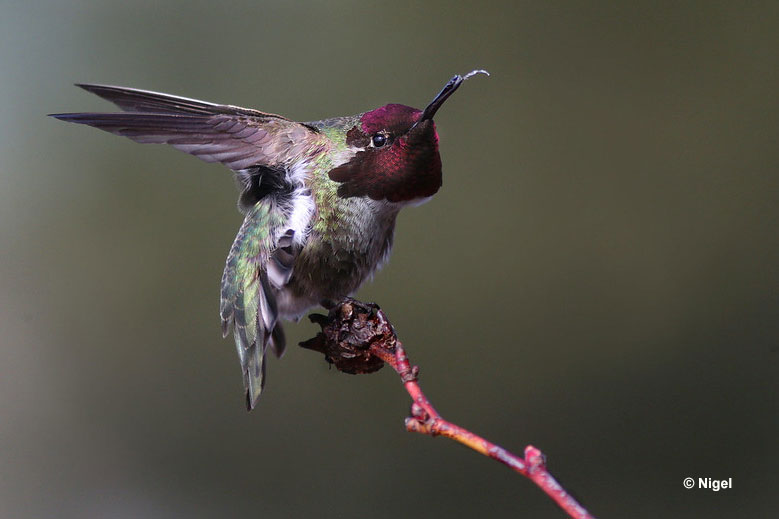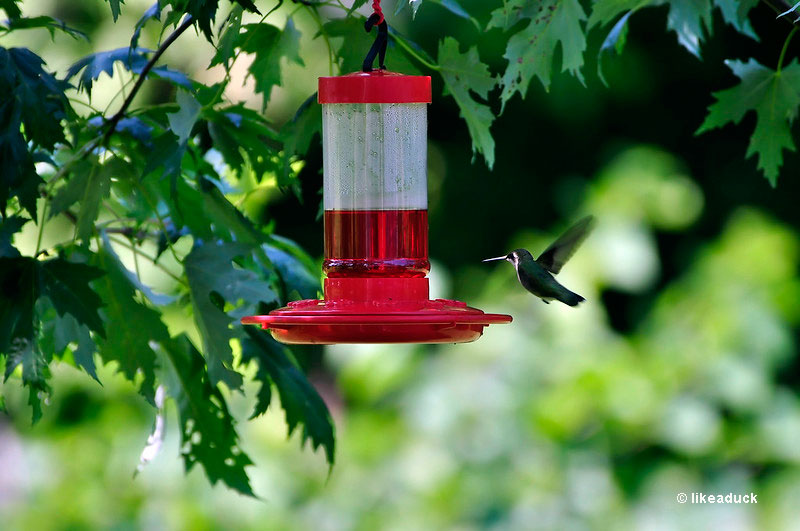
Hummingbirds need nectar, and lots of it! These beautiful little dynamos have to feed from a flower or feeder every 10 to 15 minutes. If they can’t find food, these small birds might fall into a coma and die within a question of hours!
Although they need nectar, it’s not the only item on their menu. Like all birds, hummingbirds also need a certain amount of protein. How do hummingbirds acquire protein? How often do they eat protein foods instead of nectar?
See answers in this article about hummingbirds eating insects!
On this page
Where Do Hummingbirds Get Their Protein?
Hummingbirds need protein, but they can’t get it from nectar or sugar solutions. To obtain protein, hummingbirds eat arthropods.
While your local bluebirds are happy eating mealworms, grasshoppers, and crickets, hummingbirds turn their nose up at those menu items. Hummingbirds can only get their protein by feeding on smaller arthropods.

Although we might see the glittering little birds foraging at a backyard feeder all day long, they are also taking some time to feed on insects. The quick little birds have to because if not, they start to lose weight and essentially starve to death.
Hummingbirds require protein for a lot of the same reasons that us humans and so many animals need it. Without protein, hummingbirds can’t build and maintain muscles required for their distinctive buzzy flight. They also need proteins to lay eggs as well as many basic physiological functions.
In general, hummingbirds need to ingest protein to simply be healthy and survive. Hummingbirds also need protein more often than many people realize. Most hummingbird species catch insects and other small arthropods in the morning but can also eat them throughout the day. In the absence of flowers and feeders, arthropods are the only thing that hummingbirds dine on!
What kinds of bugs do hummingbirds eat?
Surprisingly, hummingbirds love to eat bugs! However, even though hummingbirds are voracious eaters, they can’t take on every bug they see. In fact, they leave larger bugs alone.
Read more: The diet of hummingbirds
While vireos and warblers can pick up larvae with their beaks and then smash the invertebrate prey against a branch, hummingbirds don’t have that option. Their fine bills are sharp, but they are too small and delicate to pick up big bugs like grasshoppers or even insects as small as Ladybugs.
Larger hummingbird species such as the Blue-throated Mountain-gem can probably catch bigger insects than smaller hummingbird species. However, they still focus on fairly small insects, especially ones that fly.
The following arthropods are the types of insects and invertebrates that hummingbirds feed on the most.
- Flies, except for “Bluebottles” and other big horse flies.
- Aphids
- Mosquitoes (yay)!
- Small weevils
- Lots of gnats
- Aphids
- Small flying ants
- Parasitic wasps, but only small ones. Hummingbirds won’t catch hornets or other large wasp species. They actually keep their distance from them.
- Small spiders including baby spiderlets.
- Small leafhoppers
- Mites
- Various small bug and beetle species but only very small ones.
- Also known as “Daddy Longlegs”, these arachnids are frequently eaten by hummingbirds.
Hunting Patterns
Hummingbirds catch insects a few different ways. However, the most common way hummingbird species hunt for insects is by hovering and then flying to snap the small bug out of the air.
If you see a hummingbird hovering and then making a short flight forward before stopping in mid-air, and then doing it again, it’s probably catching tiny insects. They often do this in the early morning before flowers have opened, or before they produce nectar.
Hummingbirds catch tiny insects in flight by quickly snapping them up with their beak. They do it so fast, you might not see them move their bills! However, if you watch close, you might notice that the hummingbird is holding a tiny bug in its beak.
To catch bugs, they can open their beak wide or just a little bit. These small birds also catch arthropods by picking them from the surface of rocks, bark, and foliage. Hummingbirds also often snatch small bugs and small spiders directly from spiderwebs!
If a hummingbird notices a small bug in a flower, it will probably catch that insect. They also like to visit tree sap (especially in sapsucker holes) to pick small insects caught in the sticky sap.
Fun Hummingbird Facts
- Hummingbirds have extremely high metabolism. Their hearts can beat more than 1,200 times a minute!
- To keep up with their high energy needs, hummingbirds have to eat twice their body weight, every day.
- Hummingbirds avoid large insects and have to be careful around big Mantids. These large predatory insects can kill and eat hummingbirds!
- Although hummingbirds are often referred to as “nectivores”, since they also eat arthropods, they are classified as “omnivores”.
- You can attract hummingbirds by putting out a plate of mashed up fruit. This dish attracts fruit flies and other small bugs that hummingbirds love to eat.
- The best nectar recipe is simply four parts water to one part sugar. Never add red dye, honey, or syrup. These additives can harm hummingbirds!
- A combination of nectar and arthropods is ideal food for hummingbirds in late summer. They need these food items to make fat reserves for “fuel” during migration.
- Hummingbird beaks are shaped to fit into certain types of flowers. In tropical regions, there are hummingbirds with long, curved beaks, short bills, and very long, upturned beaks.
See more: 15 Facts About Hummingbirds
Frequently Asked Questions
How often do hummingbirds eat bugs?
Hummingbirds eat bugs on a daily basis. They often catch bugs in the early morning.
Do hummingbirds eat the insects hiding in flowers?
Yes, hummingbirds can eat the small insects that hide in flowers.
Do hummingbirds eat bees?
No, in general, hummingbirds do not eat bees. They tend to stay away from medium to large stinging insects.
Can hummingbirds catch insects mid-flight?
Hummingbirds can catch insects mid-flight, and they usually do. They frequently catch insects by hawking them from the air.

